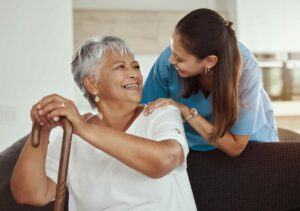Some of the changes that occur with ageing can affect the bladder. This can lead to urinary incontinence or the need to urinate more often. These issues become more prevalent over time with people over the age of 85 being five times more likely to experience bladder issues compared to those aged 65-84.[1] At Home Care Assistance, we know the impact these changes can have on a person’s life. While the changes can’t be stopped completely, there are things older adults can do to improve their bladder health.
Drink Fluids
Drinking lots of water is good for bladder health. It is recommended that people drink eight glasses of water a day. For people who need to limit their water intake for other health reasons, some other alternatives are to drink fruit juice, green tea, milk, or coconut water. Getting into the habit of drinking water, or your healthy alternative, regularly during the day makes it easier to achieve this. It can be a good idea to always keep a drink on hand.
Eat Foods High in Fibre
Constipation can also trigger bladder issues. Drinking lots of water is important to avoid constipation, but it is also important to eat foods high in fibre. High fibre foods include:
- Fresh fruits such as oranges and bananas
- Legumes, nuts, and seeds
- Cauliflower, carrots, and other raw vegetables
- Whole grains such as breads and pastas
- Air-popped popcorn – this one makes a great snack!
For older adults who have trouble managing to plan and cook nutritious meals, in-home Care Professional can help. At Home Care Assistance, our care professionals can help you or your loved one plan, shop and prepare healthy foods to meet your dietary requirements. This can make it easier to live healthily while ageing in place at home.
Maintain a Healthy Weight and Exercise Regularly
Maintaining a healthy weight and exercising regularly helps keep your bladder healthy. This requires eating a well-planned, healthy diet. For older adults who have significant weight issues, a GP can often offer assistance in how to lose weight. A decrease in activity and mobility also tends to exacerbate bladder issues.[2] Regular exercise not only helps the bladder stay healthy but also helps with weight loss which further supports bladder health.
Some older adults need assistance with exercise and diet. Your Home Care Assistance Care Professional can help with this. If it is not currently part of your or your loved one’s plan, speak to us to arrange to have these activities incorporated into the assistance provided.
Bladder Strengthening Exercises
Exercises that target pelvic and abdominal muscles can also help keep the bladder strong. One commonly used exercise for bladder health is Kegel exercises. These exercises involve deliberately contracting the muscles that control the bladder. They can be done standing up or lying down. Older adults should aim to hold the muscles contractions for 3-5 seconds 5-10 times a day.
Engage in Healthy Bladder Habits
Engaging in healthy bladder habits helps to support healthy bladder health. It is important to urinate when the need arises. ‘Holding on’ can result in bladder, urinary tract, or kidney infections. Other healthy urination habits include:
- Taking the time when urinating to allow the bladder to fully empty
- Being in a relaxed position to urinate
- Wiping from the back to prevent the spread of germs (for women)
Quit Smoking
Smoking increases the risk of bladder and kidney issues.[3] Smoking can also cause coughing which can lead to bladder incontinence. Stopping smoking is good for bladder and general health.
Regular Health Checks
Bladder issues can sometimes present as generally feeling unwell. It is important to undertake regular health screenings to ensure any issues are detected. As always, if you aren’t feeling well, see your GP.
It is natural for health and body changes to occur as part of ageing. Bladder issues can be particularly troublesome and affect a person’s quality of life. While it may not be possible to stop changes, we can certainly slow it down by engaging in good bladder habits, eating well, and doing regular exercise.
Support of an in-home care agency like Home Care Assistance, can bring enormous benefit and comfort to your quality of life while living independently at home. Home Care Assistance has viable solutions when it comes to supporting independent living. For more information, get in touch with a Home Care Assistance near me today.
[1] https://www.health.gov.au/topics/bladder-and-bowel/bladder-and-bowel-throughout-life/bladder-and-bowel-for-older-australians#:~:text=People%20aged%2085%20years%20are,hold%20as%20much%20wee%20(urine)
[2] https://www.health.gov.au/topics/bladder-and-bowel/bladder-and-bowel-throughout-life/bladder-and-bowel-for-older-australians#:~:text=People%20aged%2085%20years%20are,hold%20as%20much%20wee%20(urine)
As a leading age care provider, Home Care Assistance offers tailored in-home care services for older Australians, enabling them to live happier and healthier lives in the comfort of their own homes.
We offer private and government subsidised Care Packages and have office locations that are a registered NDIS provider. Our Care Workers undergo extensive training in order to deliver unmatched in-home aged care services where people can continue ageing in place. We are proud ambassadors of the My Aged Care government funded aged care program, enabling Australians to successfully navigate the process and gain approval for in-home care support packages. Home Care Assistance offers hourly care, specialised care, Alzheimer’s and Dementia care, hospital to home care, and 24 hour in home care.













